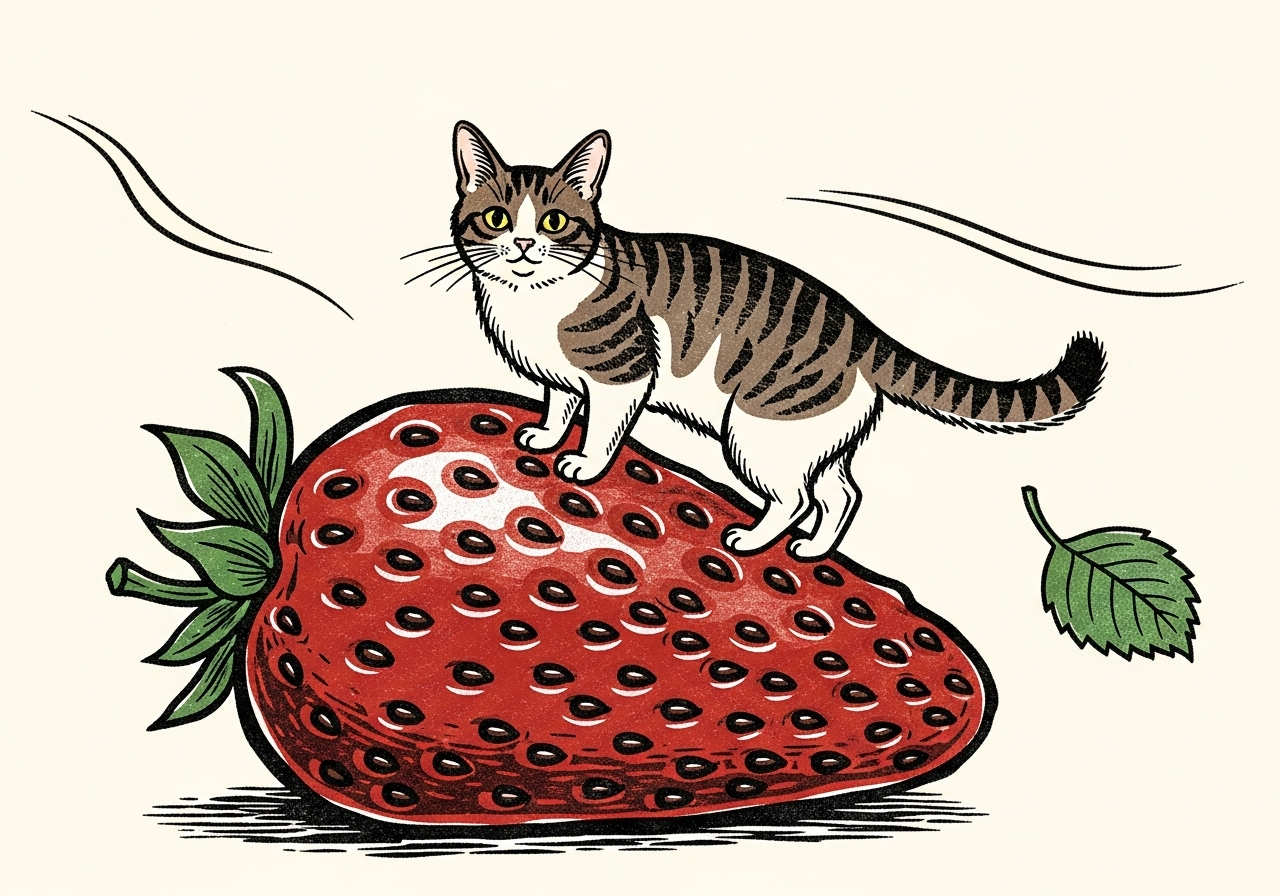Can cats eat strawberries?

It's a relief to know that strawberries are non-toxic to cats. However, as obligate carnivores, they don't need fruit in their diet. This article covers the safety of strawberries, the potential downsides of their sugar content, and the proper way to offer this fruit as a rare, tiny treat.
Can Cats Eat Strawberries? A Sweet Treat or a Risky Snack?
On a warm day, as you enjoy a fresh, juicy strawberry, you might notice your feline friend watching with intrigue. It's natural to want to share, but when it comes to cats and human food, caution is always key. So, can cats eat strawberries? The good news is that strawberries are not toxic to cats. However, this doesn't mean they should become a regular part of your cat's diet. While a tiny piece is generally safe, it's a treat that is nutritionally unnecessary for a cat and comes with a few caveats.
A Carnivore's Perspective on Fruit
Before we dive into the specifics of strawberries, we must remember the fundamental truth of feline nutrition: cats are obligate carnivores. Their bodies are fine-tuned to derive all their necessary nutrients from animal-based protein and fat. Their digestive systems are short and efficient at processing meat, not plant matter.
Interestingly, cats lack the taste receptors for sweetness. So, while we find strawberries delicious for their sugary taste, a cat's interest is likely sparked by something else entirely—perhaps the texture, the moisture, the novelty, or simply the fact that you are paying attention to it. This biological fact underscores why fruit is not a natural or necessary food for them.
Are Strawberries Actually Good for Cats? A Nutritional Look
For humans, strawberries are a superfood, loaded with Vitamin C, fiber, manganese, and powerful antioxidants. For cats, this nutritional profile is far less impressive.
- Vitamin C: Unlike humans who must get Vitamin C from their diet, healthy cats synthesize their own. They do not require an external source.
- Fiber: While a small amount of fiber can aid digestion, the fiber in strawberries is minimal and cats get all the fiber they need from their balanced commercial cat food.
- Antioxidants: Again, a good quality cat food is already fortified with the necessary antioxidants for a cat's health.
The bottom line is that strawberries offer no significant nutritional benefit to your cat. Their diet is already complete without them.
Potential Risks of Feeding Strawberries to Cats
While non-toxic, strawberries are not entirely risk-free. The concerns are primarily related to their sugar content and preparation.
- Sugar Content and Health Risks: The main drawback of strawberries is their sugar content. While natural, this sugar is a source of unnecessary carbohydrates and calories for a carnivore. Regular consumption of sugary treats can contribute to serious health issues down the line, including weight gain, obesity, and feline diabetes.
- Gastrointestinal Upset: For some cats, especially those with sensitive stomachs, the sugar and fiber in strawberries can be difficult to digest, leading to symptoms like diarrhea, gas, or vomiting.
- Choking Hazard: A whole strawberry, or even a large piece, can pose a choking risk, particularly for smaller cats or kittens.
- Pesticide Residue: Strawberries frequently top the 'Dirty Dozen' list for high pesticide residue. It is absolutely essential to wash them thoroughly before offering any to your cat to minimize their exposure to these harmful chemicals.
- Leaves and Stems: The green leafy tops and stems of the strawberry should always be removed. They are difficult for a cat to digest and could cause stomach irritation.
How to Safely Offer a Strawberry Treat
If you choose to let your curious cat have a taste, follow these steps to ensure it's a safe experience:
- Wash Thoroughly: Rinse the strawberry well under running water to remove any dirt or potential pesticide residue.
- Remove the Greens: Cut off the leaves and stem completely.
- Offer a Tiny Portion: Do not give your cat a whole strawberry. Cut off a very small piece, no bigger than a pea or your cat's thumbnail. Mashing it can also be a safe way to offer a taste.
- Keep it Occasional: This should be a rare treat, not a daily or even weekly snack. Think of it as a once-in-a-while novelty.
- Monitor Your Cat: After offering the small piece, observe your cat for the next 24 hours to ensure there are no adverse reactions like vomiting or diarrhea. If you notice any issues, it's best to keep strawberries off the menu for good.
Conclusion: A Safe Novelty, Not a Health Food
In conclusion, a tiny, well-washed, and properly prepared piece of strawberry is a safe, non-toxic treat for most cats. However, it provides no real nutritional benefits and its sugar content makes it less than ideal. The core of your cat's diet should always be a high-quality, balanced cat food formulated for their carnivorous needs. Feel free to let your curious kitty have a minuscule taste, but remember that it's just a novelty, not a health supplement.


